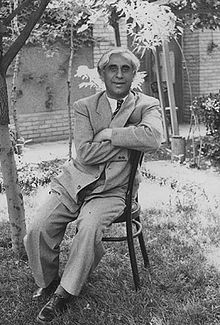Ziaeddin Tabatabaee
| Seyyed Zia'eddin Tabatabaee | |
|---|---|
 |
|
| Prime Minister of Iran | |
|
In office 21 February 1921 – 4 June 1921 |
|
| Monarch | Ahmad Shah Qajar |
| Preceded by | Fathollah Khan Akbar |
| Succeeded by | Ahmad Qavam |
| Personal details | |
| Born | 1888 Shiraz, Iran |
| Died | 29 August 1969 (aged 81) Tehran, Iran |
| Political party | Homeland Party |
Seyyed Zia'eddin Tabatabaee (1888 – August 29, 1969) (Persian: سید ضیاءالدین طباطبایی) was an Iranian politician, Mayor of Tehran (1921–1923) and the Prime Minister of Iran (Persia) from February to May 1921 under Ahmad Shah, the last Shah of the Qajar dynasty.
Born in Shiraz, Tabatabaee came to power in a coup d'état with the help of Reza Khan Mirpanj, who later became the Shah of Persia (which then came to be formally recognized as Iran by the international community), as Reza Shah Pahlavi.
When Tabatabaee became prime minister, he was 33 years old. His career did have an early start, however. In Shiraz, he first opened a newspaper called Banāy-i Islam (Foundations of Islam), followed by the newspaper Ra'd (Thunder) at the age of 23. After Ra'd was shut down by the authorities, he then published another newspaper called Bargh (Lightning), and became active in the Persian Constitutional Revolution.
His political tendencies were perceived to be pro-British by many Iranians and British diplomats. However, when he went into exile in the Palestine in the 1930s, he received money from fascist Italy and promised an oil concession in northern Iran. The historian Ervand Abrahamian characterized Tabatabaee as a "right-wing opportunist". In Palestine, he was also hired as a senior consultant by the government of Afghanistan with Britain's backing. Tehran's government vehemently objected to this move, leading Kabul to back down on the initiative.
...
Wikipedia
